Is Flutter Dead in 2026?
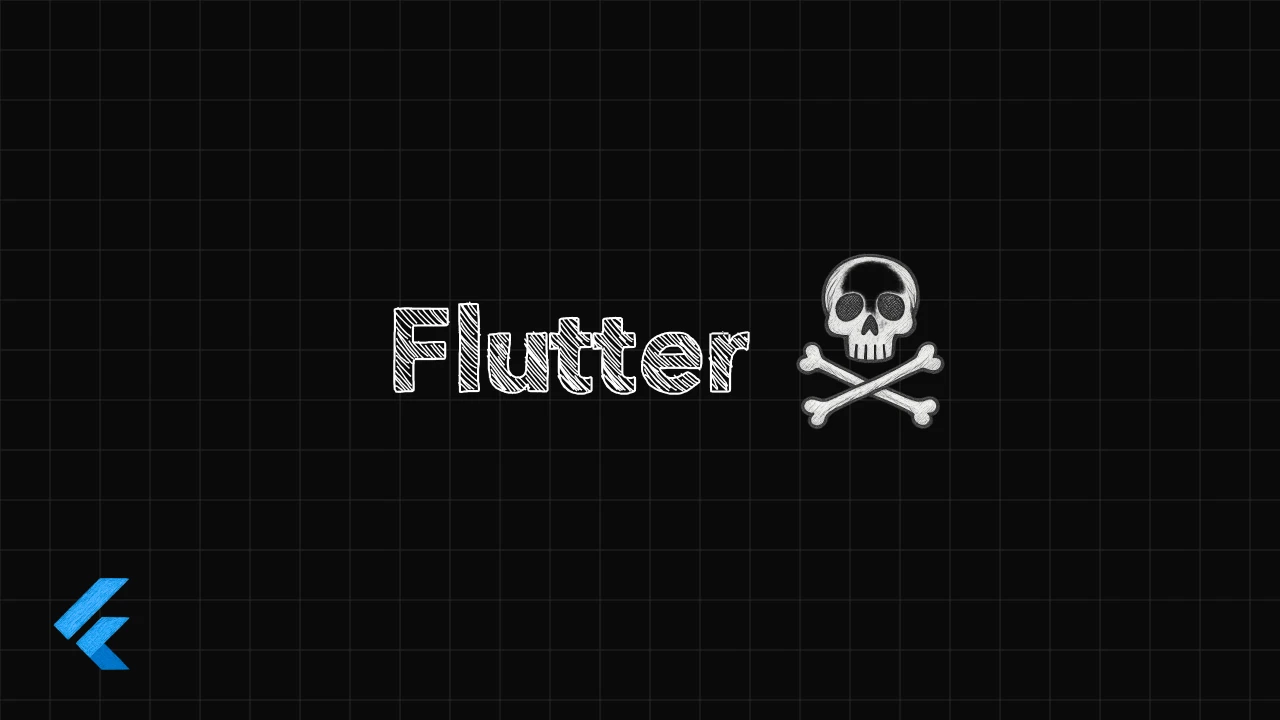
It’s basically 2026. You want to start learning Flutter, but you’ve heard someone say that Flutter is dead. What do you do? Is it really dead?
I want to acknowledge the bias right away. I am a GDE for Flutter & Dart, and I have built a business that includes a Flutter course and Flutter tools. However, the following is supported by numbers, evidence, and logic.
I have been sharing about the ups and downs of building Hungrimind, and a few people (with good intentions) have tried to help by saying I should move on from Flutter, because Flutter is dead.
I’ve spent a lot of time researching and thinking about this topic, because if they are right, then I am screwed.
What does “dead” mean?
What does it mean for a technology to be “dead”?
The real definition is that literally nobody is using it anymore. But, I don’t think that’s what people mean when saying “Flutter is dead”.
What I think they mean is: “Flutter is being used less and less and becoming less relevant, which will eventually lead to it not being used much at all”.
Now, why would they think that?
- Maybe they aren’t using it anymore. Which is fine, but that doesn’t mean it’s “dead” in general; it just means it’s “dead” to them.
- They are seeing it less on social media. Which they correlated to other people are using it less.
- They are seeing more attention on newer cross-platform solutions like Kotlin Multiplatform.
These could all be true. However, correlation does not equal causation. While it’s true that there is less attention on social media related to Flutter and more on newer solutions, it’s not because it’s “dead”.
It’s because it’s matured.
When Flutter was young, a post about “Flutter vs React Native” would be so engaging, because you could point out Flutter’s shortcomings (like not having code push, or how scrolling doesn’t act the same on iOS), and have a heated debate.
Now, the conversation is not as enticing. Both of them work well; you just choose what you like better based on your requirements.
Also, when you have a framework that is young, each release provides drastic changes, which leads to more buzz online.
Now the releases are focused on making it even more stable, so the big companies that are using it can make sure all the edge cases are covered. Accessibility changes and polish improvements are not going to make massive headlines like adding support for an entire new platform.
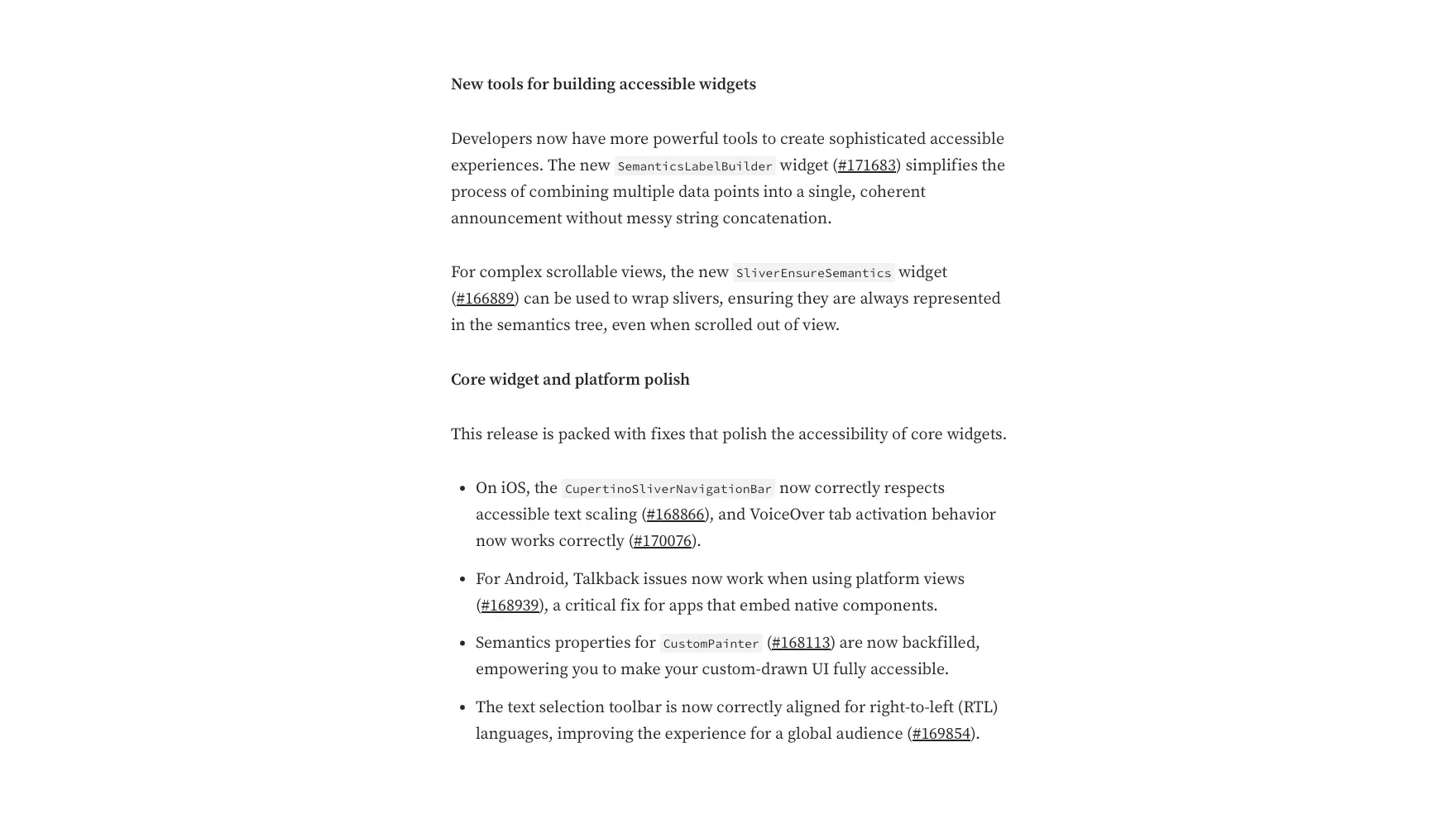
So, is it still growing?
Let’s assume that the online buzz is actually down. But is the usage of Flutter down?
Not from anything I can find.
Google Trends
Google Trends for Flutter searches shows an upward trajectory. Although it has been a less exponential growth since 2023, it’s still at an all-time high. Mature technologies get less buzz online, which partly correlates with Google Trends.
But also, the slowdown is around the same time AI chatbots got introduced. I bet that has taken a lot of Flutter’s Google Search traffic as well.
Despite those, it’s still at an all-time high.
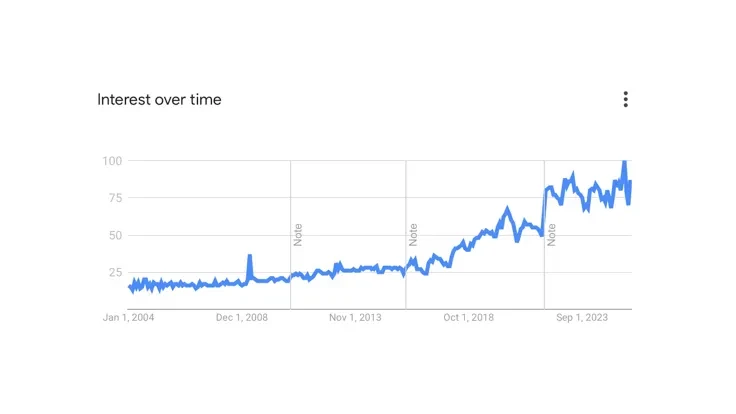
For more context, we can compare to React Native or Kotlin. Both of those have seen a little bit of a downward trend.
React Native is also a mature framework, so I expect that AI chatbots had a negative impact on Google Trends.
However, Kotlin is a little surprising, given that Kotlin Multiplatform is a newer cross-platform framework, so I would expect the Google Trends to be growing.
Still, I don’t believe either of these technologies is “dead”.
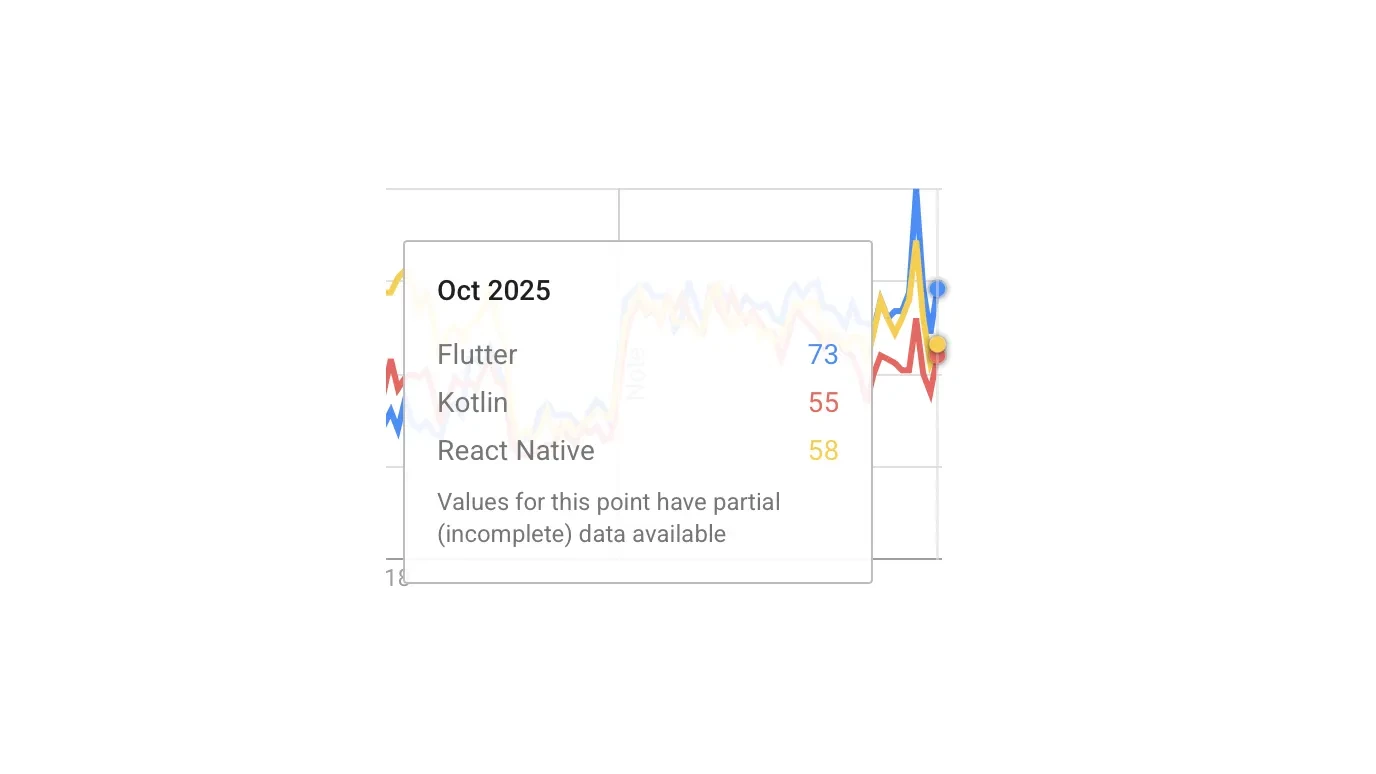
New Flutter Apps
There are over a million Flutter apps on the iOS App Store and growing every day, with 30% of new apps being built with Flutter.
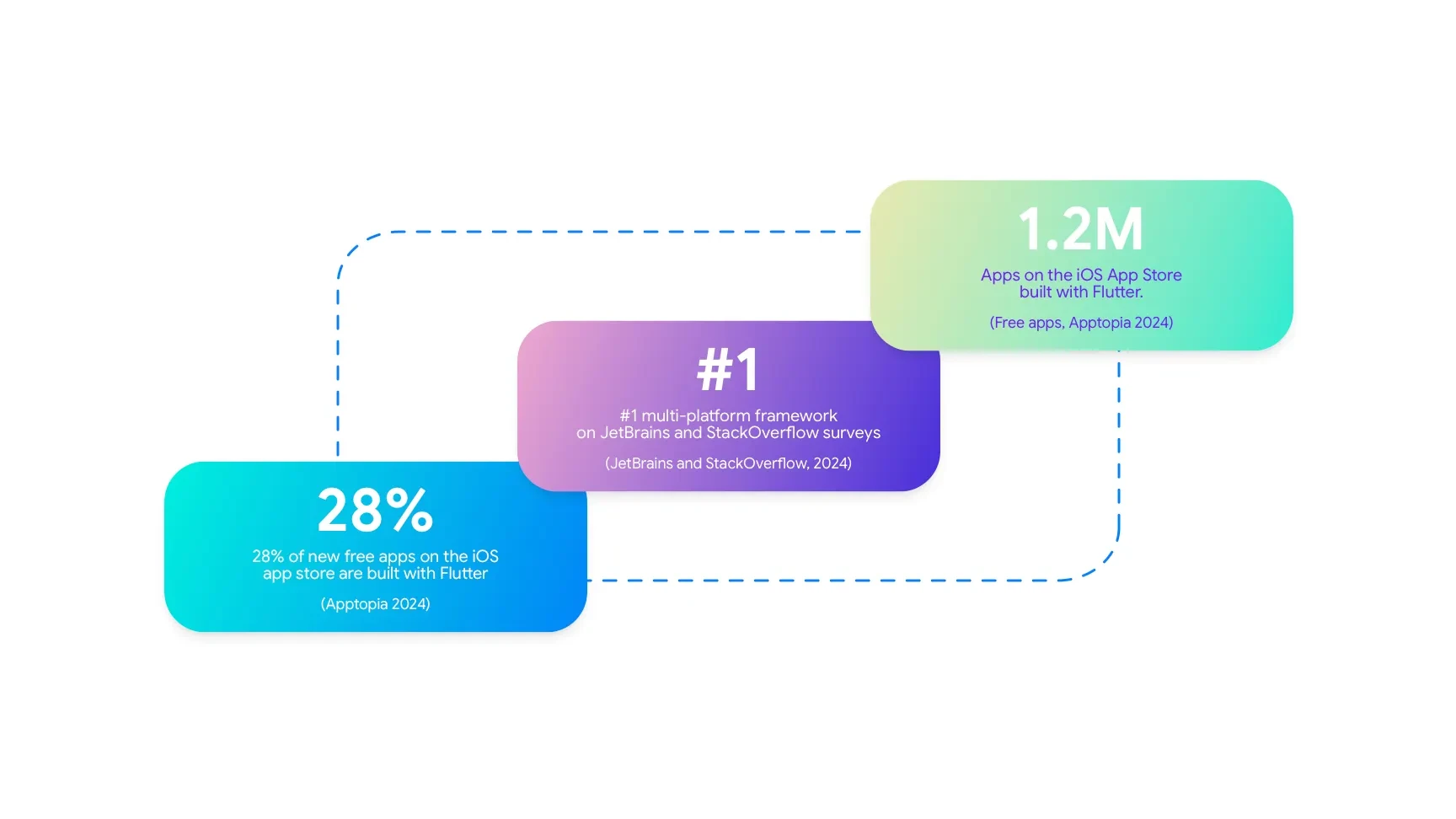
Companies Choosing Flutter
The total number of apps choosing Flutter is a positive metric, but big companies are also opting for Flutter. Google has been using it for many of their apps, like Google Pay, Google Earth, Google Classroom, and they are still choosing it for new apps like YouTube Create, which is a video editor for short-form videos.
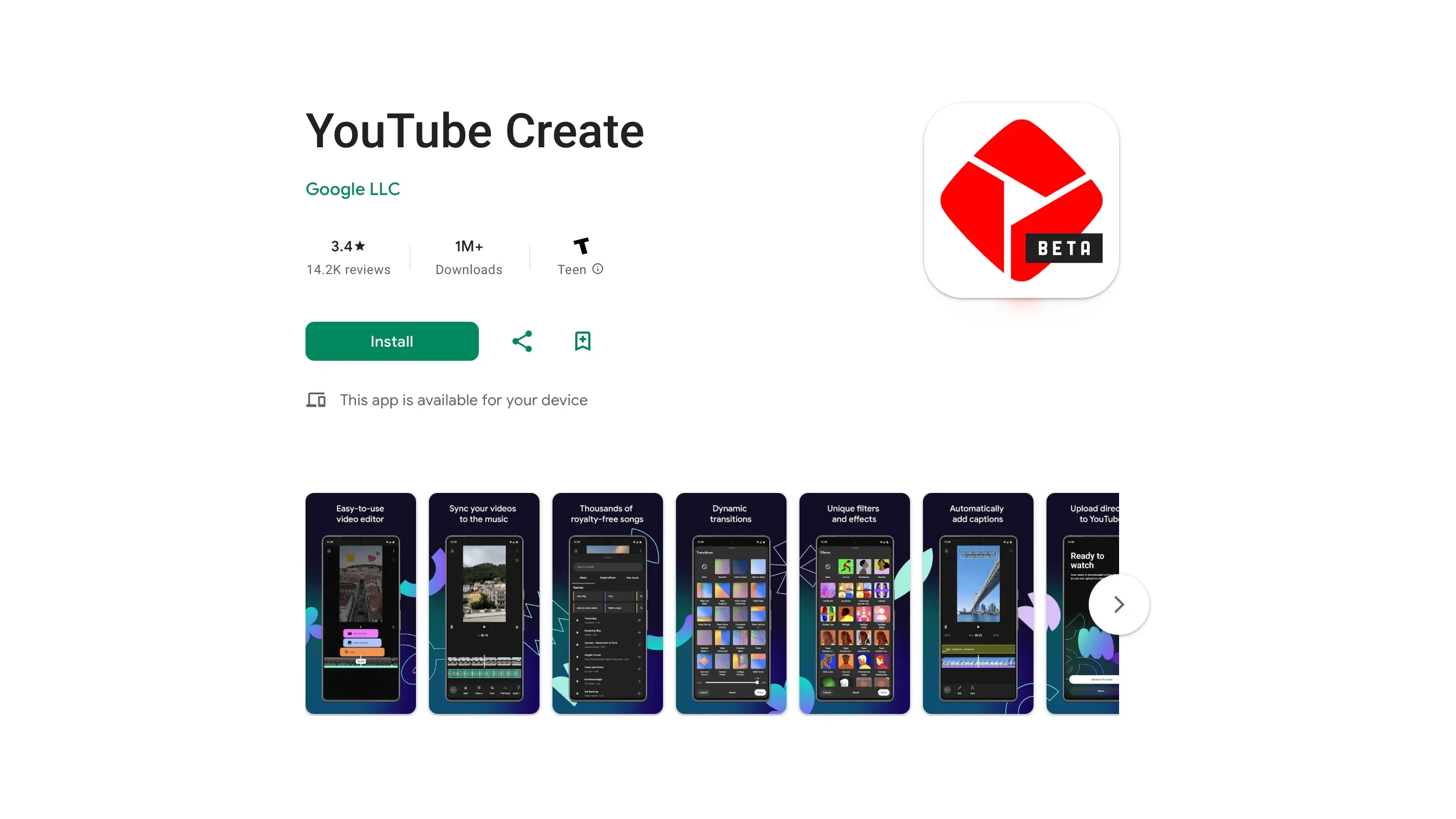
Big companies like Headspace are moving their codebase (which is downloaded by 80+ million people) to Flutter. And Canonical is not only using Flutter, but is actively developing the framework with new features like multi-window support for desktop apps.
You can find more examples on the Flutter Showcase.
Flutter Ecosystem Funding
There is also a larger ecosystem of VC-funded startups taking shape that are building tooling on top of the Flutter ecosystem.
Shorebird has raised $3M for code push for Flutter apps, and Serverpod raised $2.7M for a Dart backend, which is primarily used by Flutter apps.
Investors do their due diligence before giving companies millions of dollars, so they must believe there is a lot of growth for these companies and, in turn, for the Flutter ecosystem.
Announcing @shorebirddev has raised $3M from @Accel and other awesome investors (including @yuris @kiwicopple @migueldeicaza @startupandrew @jessicamckellar) to take Flutter further. 🚀 Onward!
— Eric Seidel (@_eseidel) September 23, 2025
Great news for all Flutter developers who want to do full-stack Dart! 🎯 Serverpod just closed our €2.7M seed round. 🥳 This will allow us to roll out Serverpod Cloud, build a new low-level server foundation for Dart through Relic, and add heaps of new features to our framework. pic.twitter.com/DsFlxaYUfK
— Serverpod 🚀 (@ServerpodDev) February 19, 2025
Flutter in AI
Flutter also pairs very well with AI. People use AI to speed up their iteration cycle. Flutter was built to solve the same problem.
If you’re “vibe coding” (or developing properly with AI), why would you want to repeat the same prompts in different codebases? As you run into issues when developing with AI, why would you not just focus on solving them in one codebase, instead of dealing with the different platform-specific problems?
The Flutter team has noticed this and is releasing a lot of AI support for Flutter developers, including Flutter Extension for Gemini CLI, Dart and Flutter MCP Servers, the Flutter AI Toolkit, and many more.
And new companies built on top of Flutter are competing at the top of the AI hype train.
Dreamflow: a new dev experience for @FlutterDev
— Dreamflow (@DreamflowApp) September 18, 2025
Now live on Product Hunt 🚀
Explore advanced visual property editor, built-in widget tree navigation, and live preview with Inspect Code — all in one agentic dev environment.
🔗 https://t.co/Tokz0AhQc6 pic.twitter.com/Lj2qz55OvP
So, the number of people searching for Flutter is at an all-time high, the number of Flutter apps being built is growing, big companies are choosing Flutter, the investments into the Flutter ecosystem are growing, and Flutter has a very valid AI play.
So, is Flutter dead? No.
What’s “dead” is the early buzz of a young framework that goes through drastic changes regularly. But what is more alive than ever is people building with and spending money within the Flutter ecosystem.
Future of Flutter
The reason people choose Flutter is because it solves a real problem: cross-platform development. As long as it continues to solve this problem well (relative to the other tools solving this problem), it will not “die”. And it’s perfectly positioned to keep growing alongside the rise of AI.
I believe Flutter can become the backbone of most AI app development. If this becomes reality, then Flutter is still in the early stages of growth, and AI companies built on top of Flutter (like Dreamflow) are going to be very successful.
As a sanity check, I asked AI: “Will Flutter be dead in 2026?”.
Here is the response:
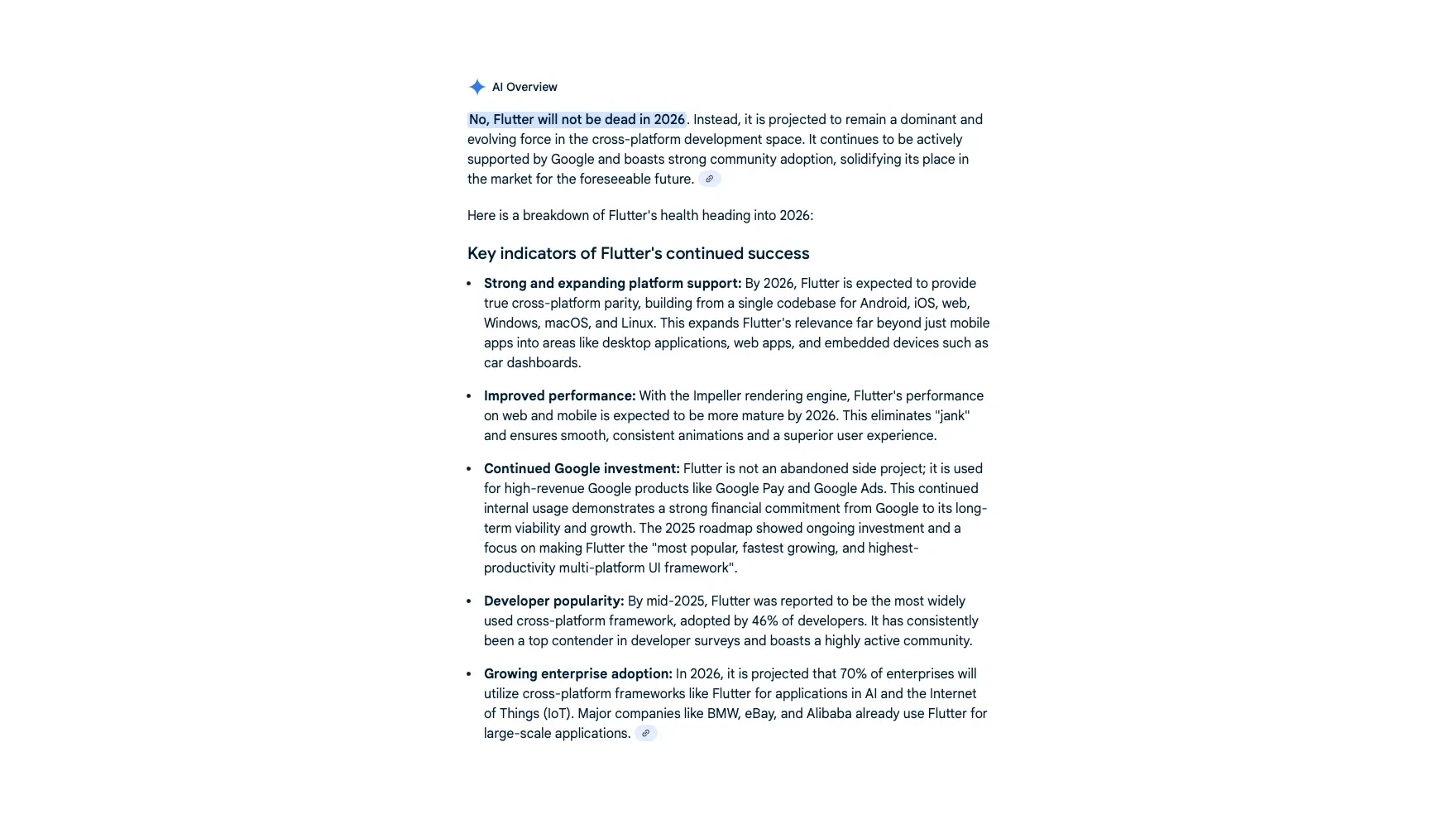
With AI having become a core part of development, understanding the technology you are working with has become more important than ever. If you are building real software to be used by others, you must
- Review AI-written code
- Be able to solve problems when AI has limitations
- Prompt in a way that apps can be scalable and maintainable
Your expertise must be stronger than ever. I encourage you to check our Best Flutter Course, where we teach you how to build production-ready applications by actually writing code and building apps in the browser.
Get Articles in Your Inbox
Sign up to get practical tutorials and production patterns delivered to your inbox.